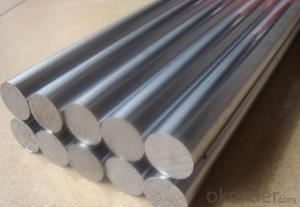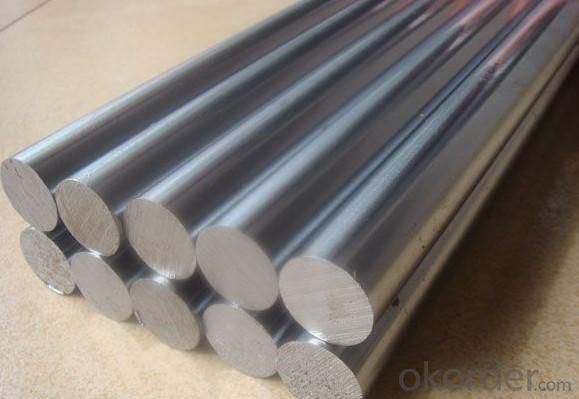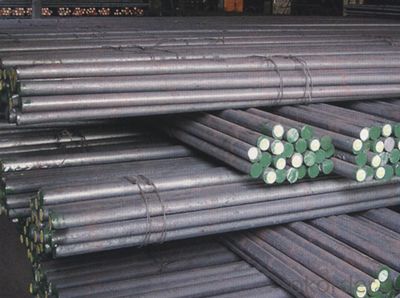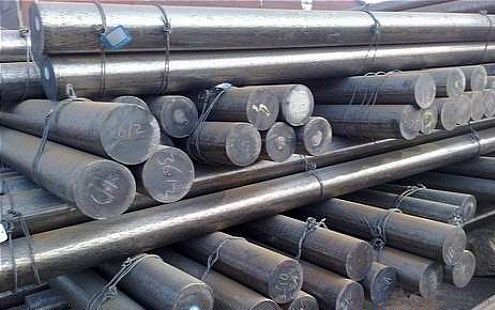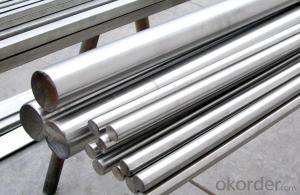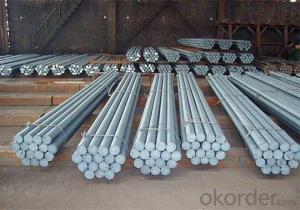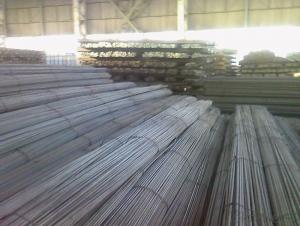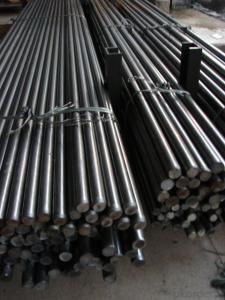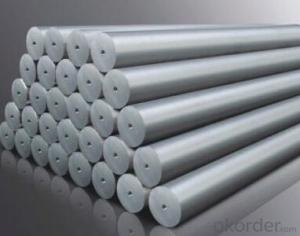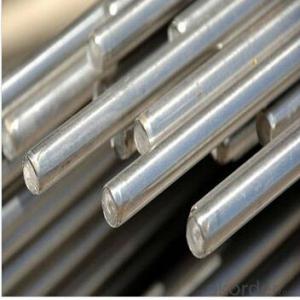Forged Spring Steel Round Bar with the Size 30mm
- Loading Port:
- Shanghai
- Payment Terms:
- TT or LC
- Min Order Qty:
- 20 m.t.
- Supply Capability:
- 500 m.t./month
OKorder Service Pledge
OKorder Financial Service
You Might Also Like
Product Description:
OKorder is offering Forged Spring Steel Round Bar with the Size 30mm at great prices with worldwide shipping. Our supplier is a world-class manufacturer of steel, with our products utilized the world over. OKorder annually supplies products to European, North American and Asian markets. We provide quotations within 24 hours of receiving an inquiry and guarantee competitive prices.
Product Applications:
Forged Spring Steel Round Bar with the Size 30mm is widely used to make the bearing used in automobile, tractor engine, transmission and the wheel. And it also used to make the main bearing for the machine tools, electrical machinery, mining machinery, electric locomotives,mechanical ventilation and high speed of grinding wheel spindle etc
Product Advantages:
OKorder's Forged Spring Steel Round Bar with the Size 30mm with High Quality are durable, diversified and qualified.
Main Product Features:
· Premium quality
· Prompt delivery & seaworthy packing (30 days after receiving deposit)
· Can be recycled and reused
· Mill test certification
· Professional Service
· Competitive pricing
Product Specifications:
Manufacture: Hot rolled
Grade: 20CrNiMoA 20CrNi2MoA 16Cr2Ni4MoA 12Cr2Ni3Mo5A 20Cr2Ni4A 20Cr2Ni2MoA
Cr4Mo4V Cr15Mo4 W9Cr4V2Mo W18Cr4V W6Mo5Cr4V2 5CrMnMo 60CrMnMoNi 37CrA 55SiMoVA etc
Certificates: ISO, SGS, BV, CIQ
Length:6m 8m 9m 12m
Packaging: Packed in bundles with standard export sea-worthy package or as customer require
FAQ:
Q1: Why buy Materials & Equipment from OKorder.com?
A1: All products offered byOKorder.com are carefully selected from China's most reliable manufacturing enterprises. Through its ISO certifications, OKorder.com adheres to the highest standards and a commitment to supply chain safety and customer satisfaction.
Q2: How do we guarantee the quality of our products?
A2: We have established an advanced quality management system which conducts strict quality tests at every step, from raw materials to the final product. At the same time, we provide extensive follow-up service assurances as required.
Q3: How soon can we receive the product after purchase?
A3: Within three days of placing an order, we will begin production. The specific shipping date is dependent upon international and government factors, but is typically 7 to 10 workdays.
Q4: How many types of bearing steel that OKorder.com can supply?
A4: Two types, carbon spring steel and alloy spring steel
Images:
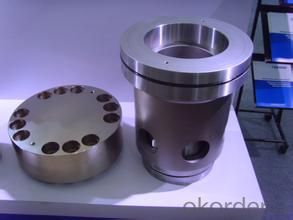
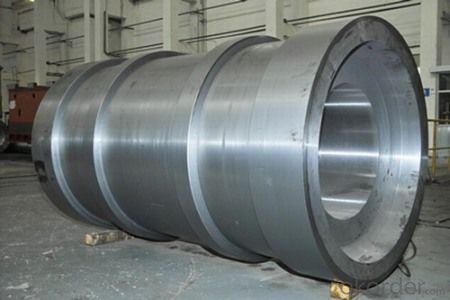
- Q: What are the specific requirements for special steel used in the nuclear fuel industry?
- The nuclear fuel industry imposes stringent and demanding requirements on special steel. These requirements are crucial to guarantee the safety and reliability of nuclear power plants. Here are some of the key specifications for special steel used in this sector: 1. Withstanding high temperatures: The special steel employed in the nuclear fuel industry must have the ability to endure high temperatures without compromising its structural integrity. This is of utmost importance as nuclear reactors generate intense heat during their operation. 2. Resisting corrosion: The nuclear fuel environments can be highly corrosive due to the presence of hot and pressurized water, radiation, and chemical reactions. Special steel used in this industry must exhibit exceptional resistance to corrosion in order to prevent deterioration and maintain safety. 3. Resisting radiation: The nuclear fuel industry involves exposure to radiation. Special steel must possess outstanding resistance to radiation damage and embrittlement in order to ensure long-term structural integrity and avoid any risk of failure. 4. High strength and toughness: Special steel used in the nuclear fuel industry should possess high strength and toughness to withstand the extreme conditions experienced within a nuclear reactor. This guarantees that the steel can endure the pressure and stress exerted on it during reactor operation. 5. Low neutron absorption: Neutron absorption is a critical factor in nuclear reactors. Special steel used in this industry should exhibit low neutron absorption properties to prevent interference with nuclear reactions and maintain reactor efficiency. 6. Stringent quality control and traceability: The manufacturing and fabrication of special steel for the nuclear fuel industry must conform to strict quality control procedures to ensure consistency and reliability. Traceability is also pivotal in identifying the origin and history of the steel, enabling comprehensive inspections and assessments. Meeting these specific requirements is crucial for the safe and efficient operation of nuclear power plants. Special steel used in the nuclear fuel industry must undergo rigorous testing, certification, and quality control processes to ensure compliance with these stringent specifications.
- Q: What are the different galvanizing techniques used for special steel?
- There are several galvanizing techniques used for special steel, including hot-dip galvanizing, electro-galvanizing, and mechanical galvanizing. Hot-dip galvanizing involves immersing the steel in a bath of molten zinc, creating a thick, durable coating. Electro-galvanizing, on the other hand, uses an electrical current to deposit a thin layer of zinc onto the steel surface. Mechanical galvanizing involves tumbling the steel in a zinc powder and glass bead mixture, which adheres to the surface through friction. Each technique has its own advantages and is used depending on the specific requirements of the application.
- Q: What are the main factors affecting the heat resistance of special steel?
- The main factors affecting the heat resistance of special steel include its alloy composition, microstructure, and heat treatment. Alloy composition plays a crucial role in determining the heat resistance of special steel. The addition of specific elements such as chromium, nickel, molybdenum, and tungsten can enhance the steel's ability to withstand high temperatures. These alloying elements form stable oxide layers on the surface of the steel, which act as a barrier against oxidation and corrosion at elevated temperatures. The microstructure of special steel also influences its heat resistance. The steel's grain size, distribution of phases, and the presence of precipitates can affect its thermal stability. Fine-grained structures and a homogeneous distribution of phases help improve the steel's resistance to creep, which is the deformation that occurs under prolonged exposure to high temperatures. Additionally, the presence of precipitates, such as carbides or intermetallic compounds, can provide strengthening mechanisms that enhance the steel's resistance to thermal softening. Heat treatment processes, such as quenching and tempering, can significantly impact the heat resistance of special steel. Proper heat treatment can optimize the microstructure and enhance the steel's mechanical properties, including its resistance to thermal degradation. For instance, a well-controlled quenching process can promote the formation of a martensitic structure, which increases the steel's hardness and strength at high temperatures. Other factors that can affect the heat resistance of special steel include the presence of impurities, surface conditions, and environmental factors. Impurities, such as sulfur and phosphorus, can reduce the steel's resistance to high temperatures by promoting the formation of brittle phases or facilitating oxidation. Surface conditions, such as roughness or the presence of cracks, can lead to localized heating and accelerated degradation. Environmental factors, such as the presence of corrosive gases or high humidity, can also influence the steel's heat resistance by promoting oxidation or corrosion processes. In summary, the heat resistance of special steel is influenced by its alloy composition, microstructure, heat treatment, impurities, surface conditions, and environmental factors. Understanding and optimizing these factors are crucial for developing special steel with superior heat resistance for various industrial applications.
- Q: What are the properties of high-temperature alloy steel?
- High-temperature alloy steel possesses several key properties that make it suitable for use in high-temperature environments. These properties include excellent strength and toughness, good resistance to oxidation and corrosion, high creep resistance (ability to withstand gradual deformation under stress at elevated temperatures), and thermal stability. Additionally, high-temperature alloy steel often exhibits good thermal conductivity and low thermal expansion, allowing it to maintain its shape and mechanical properties even at extreme temperatures.
- Q: Can special steel be used for making oil and gas industry components?
- Indeed, oil and gas industry components can be made using special steel. In the oil and gas industry, special steels like stainless steel and alloy steel are often preferred for their outstanding mechanical properties, resistance to corrosion, and ability to withstand high temperatures. These components endure harsh operating conditions, including corrosive environments, extreme temperatures, and high pressures. Special steels are specifically engineered to endure these conditions and retain their integrity and performance over time. By utilizing special steels, the oil and gas industry guarantees the dependability, longevity, and safety of vital components, including valves, pipes, fittings, and drilling equipment.
- Q: What are the different methods of improving the impact toughness of special steel?
- There are several methods for improving the impact toughness of special steel. One common method is through heat treatment processes such as quenching and tempering, which involve heating the steel to a high temperature and then rapidly cooling it. This helps to refine the grain structure of the steel, making it more resistant to cracking and improving its toughness. Another method is alloying, where specific elements are added to the steel to enhance its toughness, such as nickel, chromium, or manganese. Additionally, controlling the cooling rate during the manufacturing process, known as controlled cooling, can also improve the impact toughness of special steel by minimizing the formation of brittle phases. Overall, a combination of heat treatment, alloying, and controlled cooling can be employed to enhance the impact toughness of special steel.
- Q: What are the applications of special steel in the medical field?
- Special steel is widely used in the medical field due to its exceptional properties. It is commonly utilized in surgical instruments, implants, and prosthetics. The high strength and corrosion resistance of special steel ensure the durability and longevity of these medical devices. Additionally, its biocompatibility and ability to withstand sterilization processes make it ideal for use in critical applications such as orthopedic implants and cardiovascular stents. The use of special steel in the medical field contributes to improved patient outcomes and advancements in medical technology.
- Q: How is high-strength steel used in the automotive industry?
- High-strength steel is extensively used in the automotive industry for various applications. It is commonly used for manufacturing car frames, body panels, and structural components due to its exceptional strength, durability, and lightweight properties. This type of steel enhances the overall safety and performance of vehicles while reducing their weight, thereby improving fuel efficiency and reducing emissions. High-strength steel also provides enhanced protection in case of accidents by effectively absorbing and distributing energy during collisions.
- Q: How is tool steel different from other types of special steel?
- Tool steel is different from other types of special steel primarily because it is specifically designed to withstand high levels of stress and heat while maintaining its hardness and durability. It is specifically formulated to have high resistance to wear, abrasion, and deformation, making it ideal for cutting, drilling, and shaping tools. Unlike other special steels, tool steel has a balanced combination of properties like hardness, toughness, and heat resistance, which makes it suitable for use in various industrial applications where high-performance tools are required.
- Q: How does special steel contribute to electrical conductivity?
- Special steel, also known as electrical steel or silicon steel, plays a crucial role in enhancing electrical conductivity. This type of steel is specifically designed to minimize the electrical losses that occur during the transmission and distribution of electrical power. It achieves this by reducing the eddy current losses and hysteresis losses that arise when an alternating current (AC) flows through a magnetic material. One of the main factors that make special steel highly conductive is its chemical composition. It is alloyed with specific elements such as silicon, which improves its magnetic properties and reduces its electrical resistance. The addition of silicon increases the electrical resistivity of the steel, making it more suitable for applications that require low energy loss and efficient electrical conduction. Moreover, special steel is manufactured with a carefully controlled grain structure, which aligns the crystals in the material in a specific orientation. This alignment, known as grain-oriented, allows the steel to exhibit superior magnetic properties, making it highly efficient in conducting electrical currents. It also reduces the magnetic losses that occur when the magnetic field changes direction, further enhancing the overall electrical conductivity. The unique properties of special steel make it an ideal choice for various electrical applications, such as transformer cores, electric motors, generators, and other electromagnetic devices. Its high electrical conductivity ensures minimal energy loss during the transmission and distribution of electricity, ultimately leading to more efficient and cost-effective electrical systems. In summary, special steel significantly contributes to electrical conductivity by minimizing electrical losses through its specific chemical composition and grain structure. Its low electrical resistance and superior magnetic properties make it an essential material for optimizing energy efficiency in electrical systems.
Send your message to us
Forged Spring Steel Round Bar with the Size 30mm
- Loading Port:
- Shanghai
- Payment Terms:
- TT or LC
- Min Order Qty:
- 20 m.t.
- Supply Capability:
- 500 m.t./month
OKorder Service Pledge
OKorder Financial Service
Similar products
Hot products
Hot Searches
Related keywords
